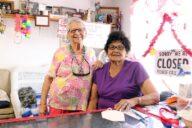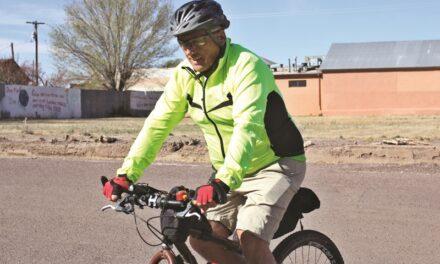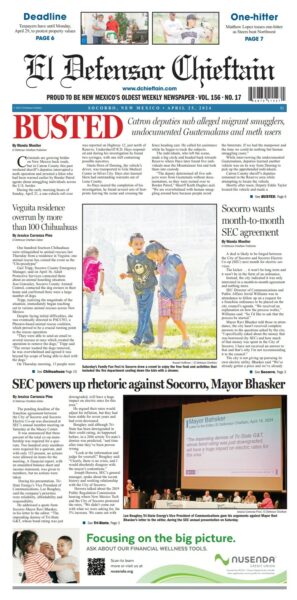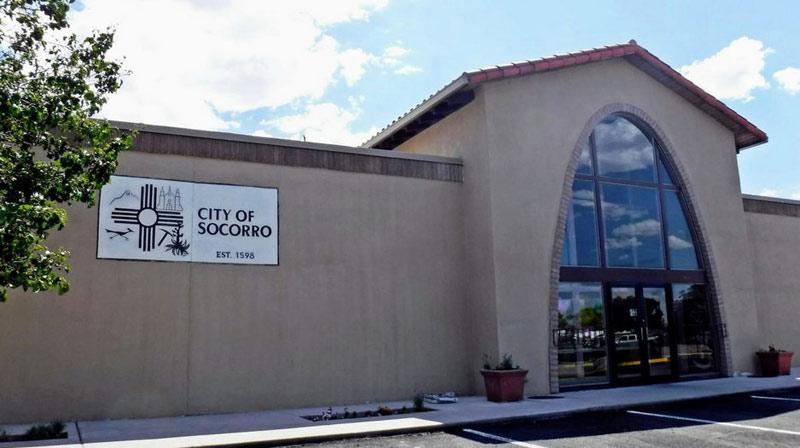SOCORRO – Anthony Ramsey, Katt and Chris, and Dennis Torgersen are just four of the estimated 25 to 30-plus people who are homeless in the city of Socorro. An estimated three times that number in the county are by definition homeless but are living either with family or friends or are “couch surfing,” according to a county-wide survey conducted by SCOPE.
Eight students are among that group, said Samantha Winter, director of Socorro County Options, Prevention and Education (SCOPE). They are individuals whose parents either moved away and the student doesn’t want to relocate; or one or more of the parents are incarcerated.
Various agencies, including SCOPE, work to address problems these vulnerable people encounter but PSI/Safe Harbor is the county’s only day center for homeless, feeding hot lunches and offering showering and laundry services three days a week.
Each of the clients at PSI/Safe Harbor has a different story, said director Zach Holcomb. Each is unique, with different backgrounds and challenges. But one thing on which the homeless and those who serve them agree: an overnight shelter or even better, a transitional facility, is greatly needed.
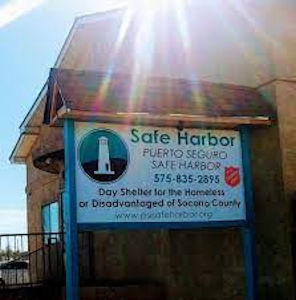
Puerto Seguro Safe Harbor, Inc. is located at 519 Old US Hwy 85, Socorro.
Courtesy photo
Dennis
Dennis Torgersen soon will mark one year of being homeless, this time. He has been homeless off and on since he was 15.
He has friends he stays with when it’s cold. Otherwise, he is often at Sedillo Park or down by the river.
A volunteer at PSI/Safe Harbor, Torgersen is one of two cooks who prepare lunches three days a week.
“I work well with the lady (cook). I feel like I’m giving back to the community. When they say ‘thank you,’ you feel good.”
“I’m fighting for my disability right now,” he said, “waiting to see the psychiatrist. For some reason, they made me restart the process.” It could take up to seven months, just to get in to see the psychiatrist, he said.
Dennis said he “most definitely” would be interested in transitional housing.
“I’ve never had a place of my own. Being in a house with a roommate would be nice.”
Help in getting through the process of getting into an apartment would also be a plus. Meanwhile, the paperwork and the wait to get in to see people at Socorro Mental Health seem almost impossible to him. And for Torgersen waiting seems endless and is very frustrating.
Katt and Chris
Katt and Chris think of themselves as travelers and hobos. The couple, who didn’t give a last name, said they feel fortunate because they have a place to live. They have been living in their car in the Socorro area for some six months, now. They like Socorro and especially like PSI/Safe Harbor where people treat each other with respect, they said.
They have been together for about a year. “Spiritually a lot longer,” said Chris.
“We’ve been a couple only a year now,” elaborated Katt, “but we’ve known each other longer. We did it right and spent time kindling a friendship first.”
Chris said he was born in Japan to a military family and they moved around often while he was growing up. Chris was also in the military for a while but suffers from PTSD from traumatic experiences as a teen.
Katt calls herself a foster-kid runaway.
“My dad was an old Dead Head. I popped out in Utah… Most of my family is in Colorado. I did get back in contact with my bio-family. I feel extremely lucky how it came out.”
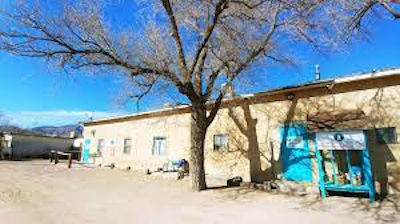
Puerto Seguro Safe Harbor, Inc. provides day services for the homeless
Courtesy photo
Katt often goes to visit her sister and plans another trip in the near future.
Meanwhile, Chris has family in the South, with plans to visit them as well.
“I get treated different because I get with people from all walks of life,” said Chris.
“We’re different than those who stay in one place and those who travel. We police our own, so to speak,” said Katt. She said she lives by the “hobo code,” which is “basically don’t be a dolt.”
Their income sometimes comes from “spanging,” Katt said, explaining the term as “spare-changing. It’s less degrading than ‘panhandling.’”
As for getting a job? “No one will hire someone who can’t bathe.”
Katt said she struggles with anxiety often and both said that mental health is a “big thing” affecting the homeless. They need someone who will listen, Chris said, “a lot of people don’t like to have people telling them what to do.”
“We’re trying to get away from the stigma,” of drug user, said Chris. Both said they do not use drugs but have seen some homeless people use drugs to nullify their pain and anxieties.
No one wants to be homeless, said Katt.
“Housing is a necessity. Most homeless are not looking for a handout, only a hand up,” she said.
Anthony
You may have seen Anthony Ramsey walking along the street with his Irish Blue Heeler, Bean. He’s been homeless for some 13 years now, he said, in part because it’s less hassle and more interesting than trying to negotiate bureaucracy.
“I used to have a disability check but it got discontinued because I missed the annual check-up,” he said. “Every three years you had to get evaluated. I didn’t even know I had an appointment.”
Ramsey said his disability came from trauma from his military experience coupled with a “home invasion homicide in which my two kids and wife were killed” while he was in the service. Previously, he had a medical equipment practice in Farmington, he said, and also for a time, a position at New Mexico Tech. Now, he has a “few places, people who know me” where he sometimes stays. He also has a tent on the river, set up with propane and a grill “and I know how to ventilate it so I don’t suffocate.”
“I’ve been studying medicine since childhood,” he said. “I was mom’s study partner. I grew up reading Gray’s Anatomy–the real Gray’s Anatomy,” he said referring to the classic textbook on human anatomy.
Of particular interest to Ramsey is the electrical static field around the human body and how it can be used to alter one’s physical reality. Another is viruses such as the current coronavirus. Ramsey said he had hantavirus and for four years, struggled with even breathing but has since recuperated.
“I’m on permanent vacation,” Ramsey said, but he also knows he’s getting older. “A house would be easier than a tent,” he admits but public housing has “too many restraints, too many stipulations. The process of getting into housing…there’s so many hoops.”
Just getting copies of his birth certificate and social security card is a complicated process.
“I’m intelligent enough and I don’t really do drugs. I’m off-grid. It’s simpler, and easier with less stress than keeping up with the Jones,” he quips.
Ramsey said most of the people he sees at PSI/Safe Harbor, “don’t judge; they’re honest. People out on the streets are infinitely more realistic. They already see themselves and that the rest of it is pointless. Most of them figure no one cares anymore.”
At the same time, he said, “one of the main reasons I’m homeless is I’m trying not to remember my family dying. Being on the streets keeps me busy. You have to sleep with one eye open.
“Most homeless are like that. Somehow they lost everything they had and they’re just trying to cope.”


